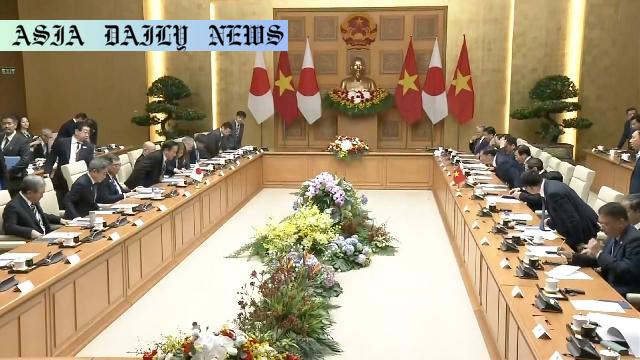Japan-Vietnam Relations: Deepening ties on economic and security fronts.
Japanese PM Ishiba meets Vietnamese PM Chinh to discuss key issues.
Agreed on boosting security ties and tackling global US tariff impacts.
Discussed regional stability, including the East/South China Seas and Myanmar.

Overview of the Bilateral Meeting Between Japan and Vietnam
Japanese Prime Minister Ishiba Shigeru met with Vietnamese Prime Minister Pham Minh Chinh in Hanoi as part of Ishiba’s Southeast Asian diplomatic tour. The meeting highlighted the significance of deepening bilateral ties in areas of mutual interest. Central to the discussions were economic impacts stemming from global US tariff policies, countermeasures by China, and their implications on businesses. Both leaders recognized the need to uphold a robust multilateral free trade system to mitigate cascading economic disruptions.Against the growing tensions in the East and South China Seas, both nations underscored their commitment to maintaining a rules-based, free, and open international order. The meeting showcased mutual intent to amplify collaboration, ensuring stability and security amid increasing maritime activities by China in the region.
Enhancing Security and Defense Cooperation
One of the most significant outcomes of the meeting was the decision to bolster security cooperation through the launch of vice-ministerial-level meetings involving foreign affairs and defense officials. Scheduled to commence in Japan later this year, this initiative reinforces shared responsibility in addressing regional conflicts and fostering peace.Additionally, the leaders expressed concerns regarding North Korea’s escalating missile capabilities and its evolving ties with Russia. The political and humanitarian crisis unfolding in Myanmar also featured prominently during the discussions, emphasizing the pressing need for collaborative regional solutions among Southeast Asian countries and Japan.
Aligning Efforts for Economic and Environmental Progress
On the economic front, Ishiba highlighted Japan’s steadfast commitment to supporting Vietnam’s infrastructure projects and environmental goals. Both nations agreed to pursue a low-carbon society by implementing green initiatives and enhancing disaster mitigation strategies. Furthermore, initiatives were outlined for enhancements in human resource development, especially in advanced sectors like semiconductors, where knowledge-sharing and capacity-building are critical.The partnership also aims to navigate and mitigate the economic challenges arising from the US-China trade war. Japan’s assurance to Vietnamese businesses of proactive measures demonstrates the country’s commitment to regional economic stability. This partnership is not only vital for both nations but also underlines the significance of Japan and Vietnam’s strategic geographical positions in ensuring a prosperous Indo-Pacific region.
The Strategic Importance of Deepened Japan-Vietnam Relations
During their joint press conference, the leaders reiterated the importance of strengthened collaboration in underpinning regional prosperity and balance. Ishiba emphasized that Vietnam’s geopolitical relevance makes it an indispensable partner for Japan in efforts to uphold stability across Southeast Asia. By aligning their security and economic goals, Japan and Vietnam are poised to set an example of a successful bilateral partnership driving regional progress.Furthermore, the newly unveiled era of cooperation is expected to foster lasting diplomacy capable of addressing shared challenges ranging from geopolitical tensions to environmental imperatives. As this partnership evolves, it holds the promise of redefining cooperative dimensions within the Asia-Pacific region.
Commentary
Strategic Diplomacy in Action
The bilateral meeting between Prime Minister Ishiba Shigeru and Prime Minister Pham Minh Chinh is reflective of a broader strategy aimed at fostering sustainable partnerships in Southeast Asia. In today’s turbulent global landscape, collaboration between nations like Japan and Vietnam demonstrates how strategic diplomacy can address transnational challenges effectively.Key takeaways from the meeting underline the essence of bilateralism. Addressing US tariffs alongside the ripple effects of China’s countermeasures is a timely concern, given their pervasive impact on global economies. Japan’s readiness to take proactive steps to protect its businesses also sets a reassuring tone for allied economies looking for stability during uncertainties.
Defending Regional Stability
The security discussions stand out as a hallmark of this meeting. As China ramps up its maritime maneuvers, collaborations like initiating vice-ministerial-level dialogues signal a robust counterbalancing approach. More broadly, these measures reiterate the resolve of Japan and Vietnam to champion international standards in conflict-sensitive regions including the East and South China seas.At a time when maritime disputes and sovereignty claims continue to create friction, partnerships built on shared values can pave the way toward a more harmonious Asia-Pacific. Japan’s firm stance against escalating regional tensions and nuclear threats further underlines its credibility as a stabilizing actor in the east.
Setting Foundations for a Future-Ready Agreement
Beyond security, the focus on advanced industries like semiconductors serves as an excellent example of how forward-looking cooperation can cater to the growing demand for technological resilience. In a world heavily reliant on semiconductor technology, bilateral efforts could facilitate economic growth and disaster mitigation.[br>This partnership highlights the strategic significance of Japan-Vietnam relations in addressing regional and global challenges. Both nations are setting their sights on reshaping Southeast Asia into a hub of economic resilience, environmental stewardship, and cooperative problem-solving.


